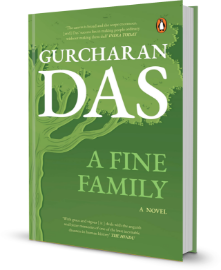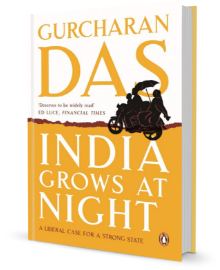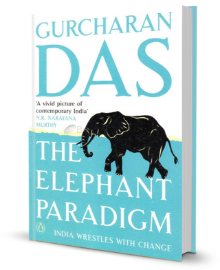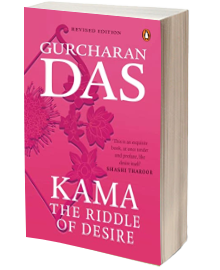

A Fine Family
A Fine Family tells the story of several generations of a Punjabi family. Bauji a successful lawyer is forced to flee India by the violence and instability unleashed by Partition. Bauji has lost everything in the transition, and when his daughter Tara gives birth to a son, Arjun, everyone's hopes are pinned on the child to revive the family's fortunes in an independent India.
-
1) "Gurcharan Das' novel is a worthy addition to the body of fiction that deals with the anguish and bitter memories of one of the most sorrowful and least inevitable disasters in human history….What makes A Fine Family intriguingly different is a determined effort on the part of the novelist to evolve a pragmatic philosophy and a code of ethics for the protagonist…He has attempted to break new ground in so far as a boxwallah had hardly been hero material in traditional British fiction based in India or in the novels written by Indians…Das seems to prefer a more formal style in which he is perfectly at home and he writes with grace and vigour.
--The Hindu, 24 July 1990 -
2) "A Brilliant Debut! …a fascinating novel which spans three generations of a Punjabi family, two countries and several decades in time…For a first novel this is a major achievement. Gurcharan has woven in these pages emotions which ring true to life, the work of a man who understands it.
--The Indian Post, 20 May 1990 (by M.V. Kamath) -
3) "The canvas is broad and the scope enormous. But Das' success lies in making people ordinary without making them dull….They are contended middle class people with middle class dreams. But they possess true grit and emerge out of each crisis with honour… the book is engaging, not demanding. It does not confuse the reader with a cast of thousands who promptly develop incestuous 13 and complicated relationships. And it is written smoothly. It is a tale told simply, the kind to read with feet up on a stool near the fireplace on a winter night. At a time when fiction prides itself in appearing clever, A Fine Family shines because of its simplicity.
--India Today, 15 March 1990 (by Salil Tripathi). -
4) "There is no doubt that this is a well- researched piece on life in pre-partitioned times, especially relating to middle class families and the trauma. Descriptive, factual and spanning almost three generations, a fine novel but only if you have time for some serious reading…some reasonings that do appeal like, 'she had always been passionate and it was easier to make a mystic out of a passionate person than a prig.'"
--Deccan Herald, 9 April 2000 -
5) "A Fine Family is a deeply insightful and thoughtful novel about urban middle-class India from 1942 to the Emergency. It is the book of a believer; an optimist with faith in India, her people, her institutions, and her future…as Bauji says, 'The important thing is not self-fulfilment but that life should go on; survival is a virtue in itself.' These are flesh and blood characters to whom one can relate…finely nuanced, all too human, all of them seekers, beset with self-doubt.
--Indian Review of Books, 16 June-15 July 2000. -
6) "The novel [is] a study of middle-class society. The values of such a society are often questioned and change according to circumstances. As in the case of Anees, 'Bauji felt a sensual nagging…the sensual impulse stung him and made him blush. Deep inside he wrestled with his middle-class scruples.' But he made his decision any way…The novel deals with three generation of voices. The characters represent their own periods…and make the novel authentic. It is the narration that holds our attention.
-- Daily, 27 May 1990.



